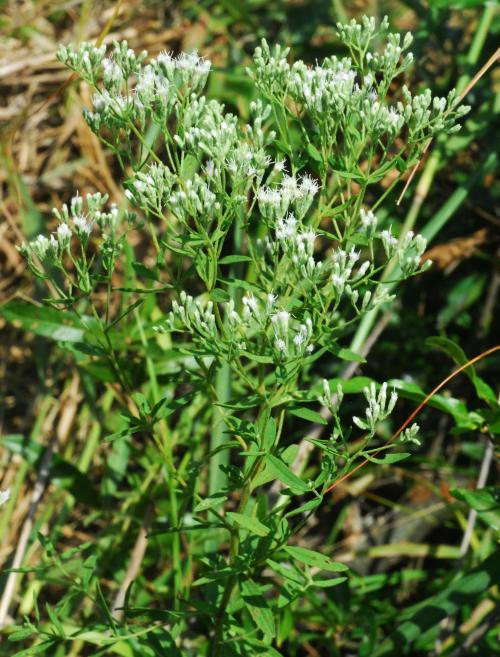Eupatorium semiserratum DC.
Thoroughwort

Native
CC = 8
CW = -3
MOC = 8
© SRTurner
Eupatorium semiserratum DC.Thoroughwort | |
 |
Native CC = 8 CW = -3 MOC = 8 |
© SRTurner |
|
Family - Asteraceae/Eupatorieae Habit - Perennial forb, fibrous rooted and usually rhizomatous. Stem - Erect, to 1.2 m, moderatly to densely short-hairy, not hollow.
Leaves - Mostly opposite, simple, sessile or sometimes with a poorly differentiated petiole, often twisted to appear erect. Blades to 8 cm, oblanceolate to elliptic, tapered at base, blunt at tip, margins irregularly toothed, surfaces short-hairy and gland dotted. Lateral veins branching from midvein 2-12 mm from base of leaf. Axillary fascicles sometimes present at some nodes.
Inflorescence - Terminal panicles, +/- flat-topped.
Involucres - Narrowly cup-shaped, 2.5-4.0 mm. Bracts densely short-hairy, green.
Florets - Disk florets 5 per head. Corollas 2.5-3.5 mm long, white, sometimes glandular.
Flowering - August - October. Habitat - Forest margins, swamps, old fields. Origin - Native to the U.S. Lookalikes - E. hyssopifolium and related hybrids. Other info. - Despite its weedy appearance, this plant is uncommon in Missouri and represents an unusual and notable find. Its range in the state is restricted to the bootheel region. Beyond Missouri it occurs in only a few southeastern states. The plant is recognized by its inflorescences of small, dirty white heads, which contain 5 florets each. The leaves are generally elliptic and irregularly toothed, and are opposite but not whorled at nodes. Photographs taken at Otter Slough Conservation Area, Stoddard County, MO, 8-13-2015, 8-15-2021, and 8-19-2024 (SRTurner). |